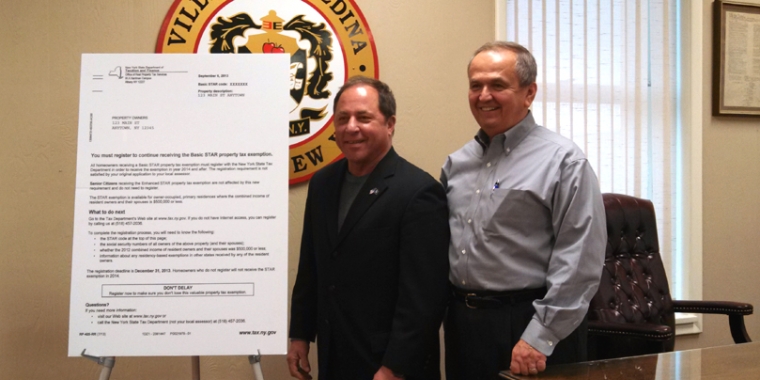
Senate approves Job Creation & Taxpayer Protection Act
George D. Maziarz
January 19, 2011
-
ISSUE:
- Economic Development
The New York State Senate acted today on the Job Creation and Taxpayer Protection Act of 2011, a three-part plan to encourage the creation of new private sector jobs and ensure fiscal responsibility, including the enactment of a two percent state spending cap and requiring a two-thirds “super majority” vote to increase taxes.
The Job Creation and Taxpayer Protection Act of 2011 includes the following measures:
INCENTIVES TO CREATE NEW JOBS
The plan would provide businesses with a three-year tax credit of up to $5,000 for each new job created. In addition, the plan would eliminate taxes for small businesses and manufacturers that pay the state’s corporate franchise tax and roll back the income tax surcharge placed on them by Democrats in 2009. It also places a moratorium on new taxes, fees and regulations that are killing private sector job-creation efforts in the state.
That credit could grow by as much as an additional $3,000 per job if new hires are taken from the ranks of the unemployed who are collecting unemployment insurance from the State. Such an incentive would help reduce unemployment and the costs borne by taxpayers.
Twenty-four states have a job creation tax credit. The temporary job creation tax credit created with bipartisan support by the federal government last year, expired December 31st. However, legislation has already been introduced in Congress to renew it.
The recently expired federal legislation provided the tax credit if an employer hired a new worker off unemployment. That restriction is not part of the Senate Republican’s plan, but an additional tax credit would be provided to employers if they hire someone off unemployment.
Should the same federal tax credit incentive be renewed, when combined, the two plans would save employers thousands of dollars for each job they create. Under the Senate Republican proposal, if a business creates a new job with a salary of $35,000, it would receive a $1,487 tax credit. If the business hires someone off unemployment, it would receive an additional $3,000 credit.
The federal plan would provide that same business a tax credit of $2,170 and an additional $1,000 if the employee is retained for a year.
The proposal applies only to new jobs and employees that don’t currently provide New York with any payroll revenue.
The plan also places a moratorium on any new business taxes and fees and eliminates the corporate franchise tax for hundreds of small businesses and manufacturers with 50 or fewer employees and less than $2 million in net income. It also accelerates the phase-out of the PIT increase on small businesses that are scheduled to expire at the end of this year.
The jobs initiative would also prohibit the State from enacting any new regulations on New York companies, and create a new Berger-style commission that would have the power to eliminate regulations which are currently hindering businesses.
STATE SPENDING CAP
This will be the third time that Senate Republicans have voted to pass a state spending cap that ensures New York spends no more than taxpayers can afford. The cap, which would be set at 2 percent or 120 percent of the CPI (currently 1.9 percent), whichever is lower, would ensure that the state reduces spending and lives within its budget, easing the burden on taxpayers.
Under the constitutional amendment (S.1892), sponsored by Senator Ranzenhofer, year-to-year State spending increases would be limited to 120 percent of the Consumer Price Index (CPI) or 2 percent, whichever is less. In any given year, fifty percent of tax revenue that exceeded the cap would be placed in a reserve fund and fifty percent would be returned to taxpayers in the form of direct tax rebates.
If the state spending cap was in place now the state would be forced to reduce projected spending next year by $9 billion, forcing the budget gap to be solved without raising taxes. Had the state spending cap been in place for the past 10 years the state would be spending $30 billion less next year.
In addition, the proposal would force the Executive to resubmit a balanced Budget to address any shortfalls in revenue that occur after the submission of the Executive Budget, and make any necessary spending revisions to reflect the declining revenue.
The constitutional spending cap proposal would give the Executive the authority to exceed the cap in the event of a fiscal emergency or other extraordinary circumstances, however, the Comptroller would be required to independently certify the financial crisis.
According to a report by the National Conference of State Legislatures, thirty states have put in place statutory or constitutional tax or spending limits.
SUPERMAJORITY VOTE TO RAISE TAXES
In the last two years, this Legislature -- under all-Democrat control -- raised taxes by $14 billion. In the Senate, it would have taken only one vote to stop these tax hikes that devastated families and businesses. This constitutional amendment would require a two-thirds “super majority” vote in each house, rather than a simple majority, to make it much more difficult to raise state taxes. Sixteen states currently require more than a majority vote to increase taxes.
Business groups were quick to weigh in with praise for the plan.
The Business Council of New York State, Inc. President and CEO Kenneth Adams said, "The Senate Republicans are on the mark to focus on controlling state spending and taxes to create jobs. A state spending cap is a necessary reform to bring fiscal sanity to New York."
Mike Elmendorf, New York State Director of the National Federation of Independent Business (NFIB), New York and the nation's leading small business advocacy organization said: "Small business understands that in order to restore and grow our economy, New York's destructively oppressive tax burden and cost of doing business must be reduced. The package of common sense reforms being advanced today by the Senate Majority is an important step in that direction and includes policies NFIB has strongly supported, such as a spending cap and requiring a super-majority vote to increase taxes and fees. We commend the Senate Majority for continuing to stand with job creators and look forward to working toward enactment of these important pieces of legislation to make our state more affordable and our economy more viable.”
MACNY President Randy Wolken stated, "Through introduction of this business friendly legislation, so early in the session, it is clear to me that the Senate majority is prepared to be an active participant in getting our business climate back on track in New York State. The components set forth by the Senate majority, including a comprehensive jobs plan, creation of a state spending cap and a constitutional amendment requiring a 2/3 vote on revenue increases are all simple and effective methods that will create a better business climate and allow New York State to regain its financial footing. On behalf of MACNY and its collective membership, we look forward to working with the Senate majority on ensuring passage of this and other business friendly legislation throughout the 2011 session."
Unshackle Upstate Executive Director Brian Backstrom said: "The introduction of the Senate Majority's plan to promote job growth, cut burdensome taxes and stop unnecessary regulations on New York's struggling business community is a first step to reviving our state's economy. Today's announcement sends a clear message that the members of the Senate Majority are committed to fulfilling their campaign promises of lowering taxes and fostering private sector job development. But we need both houses and both parties to do what is right for struggling New York businesses. It’s time to pass these bills."
Kevin S. Law, President and CEO of the Long Island Association said: "It’s refreshing to see the Governor and the Senate Majority Leader in the same page when it comes to writing a prescription to cure New York State and Long Island's ailing economies," said. "The combination of a state spending cap and tax credits for businesses big and small, sets the right tone that we can grow ourselves back to a healthier economy. I commend Senate Majority Leader Skelos on his leadership."
Garry Douglas, North Country Chamber of Commerce in Plattsburgh said: "These two constitutional amendments would be two home runs for New York's future. They would help to put a constitutional end to Albany's destructive addiction to runaway spending and taxing. And while we need to do many other tough things in the near term, we also need to take steps like these to impose lasting changes so bad habits can't return. The Job Creation and Retention Package is also a welcome proposal. Small business owners in the North Country and across the state are waiting for signs that Albany is going to start making it easier instead of harder to save and add jobs. This combination of job creation tax credits, small business relief, and an end to runaway regulations by state bureaucrats would be a powerful new message that could actually encourage rather than discourage those enterprises which form the heart and soul of our state's economic future."
####
Share this Article or Press Release
Newsroom
Go to NewsroomPSC puts Maziarz bill into practice
November 25, 2013
Lockport WWII veteran Ed Kolek named to French Legion of Honor
November 22, 2013

Senate GOP issues report on tax reform; calls for simplified tax code
November 19, 2013

